Enforcement of Contractual Terms in Australian Law
VerifiedAdded on 2023/06/08
|11
|3130
|467
AI Summary
This article discusses the enforcement of contractual terms in Australian law. It explains the legal relationship between parties and their rights and obligations. It also highlights the essential elements of a valid contract and the consequences of violating its terms. A relevant case law is also discussed to provide a better understanding of the topic.
Contribute Materials
Your contribution can guide someone’s learning journey. Share your
documents today.
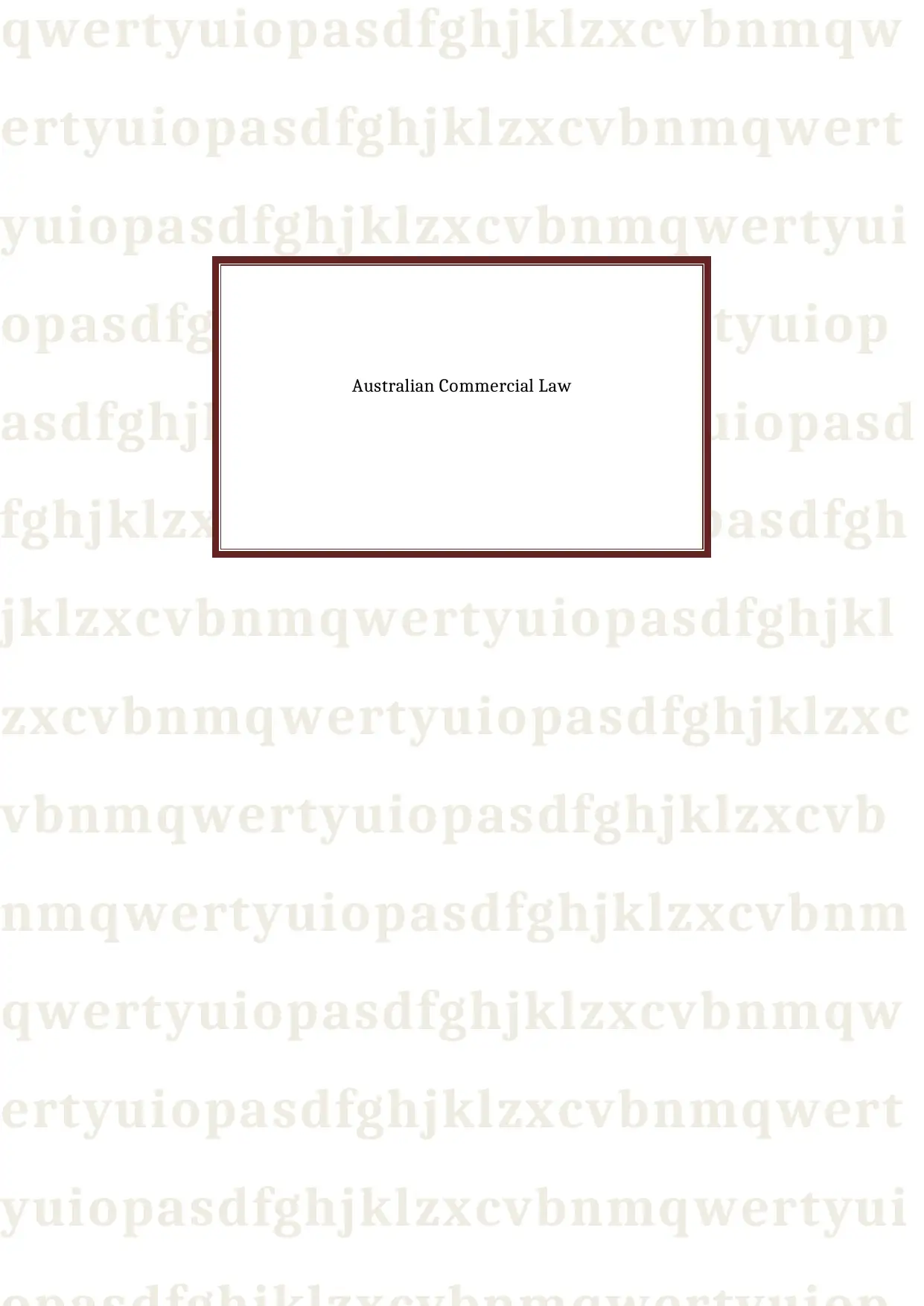
qwertyuiopasdfghjklzxcvbnmqw
ertyuiopasdfghjklzxcvbnmqwert
yuiopasdfghjklzxcvbnmqwertyui
opasdfghjklzxcvbnmqwertyuiop
asdfghjklzxcvbnmqwertyuiopasd
fghjklzxcvbnmqwertyuiopasdfgh
jklzxcvbnmqwertyuiopasdfghjkl
zxcvbnmqwertyuiopasdfghjklzxc
vbnmqwertyuiopasdfghjklzxcvb
nmqwertyuiopasdfghjklzxcvbnm
qwertyuiopasdfghjklzxcvbnmqw
ertyuiopasdfghjklzxcvbnmqwert
yuiopasdfghjklzxcvbnmqwertyui
Australian Commercial Law
ertyuiopasdfghjklzxcvbnmqwert
yuiopasdfghjklzxcvbnmqwertyui
opasdfghjklzxcvbnmqwertyuiop
asdfghjklzxcvbnmqwertyuiopasd
fghjklzxcvbnmqwertyuiopasdfgh
jklzxcvbnmqwertyuiopasdfghjkl
zxcvbnmqwertyuiopasdfghjklzxc
vbnmqwertyuiopasdfghjklzxcvb
nmqwertyuiopasdfghjklzxcvbnm
qwertyuiopasdfghjklzxcvbnmqw
ertyuiopasdfghjklzxcvbnmqwert
yuiopasdfghjklzxcvbnmqwertyui
Australian Commercial Law
Secure Best Marks with AI Grader
Need help grading? Try our AI Grader for instant feedback on your assignments.
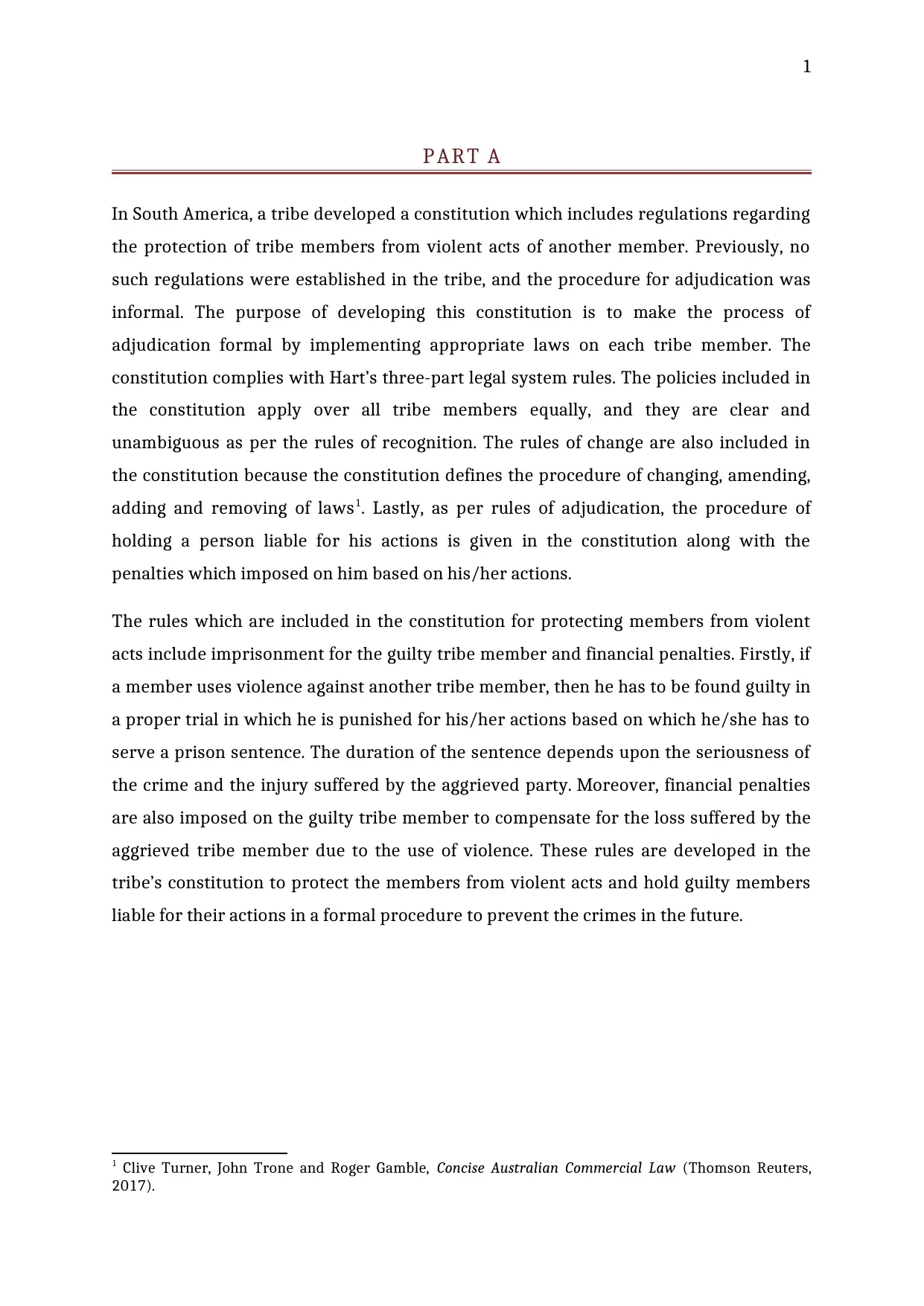
1
PART A
In South America, a tribe developed a constitution which includes regulations regarding
the protection of tribe members from violent acts of another member. Previously, no
such regulations were established in the tribe, and the procedure for adjudication was
informal. The purpose of developing this constitution is to make the process of
adjudication formal by implementing appropriate laws on each tribe member. The
constitution complies with Hart’s three-part legal system rules. The policies included in
the constitution apply over all tribe members equally, and they are clear and
unambiguous as per the rules of recognition. The rules of change are also included in
the constitution because the constitution defines the procedure of changing, amending,
adding and removing of laws1. Lastly, as per rules of adjudication, the procedure of
holding a person liable for his actions is given in the constitution along with the
penalties which imposed on him based on his/her actions.
The rules which are included in the constitution for protecting members from violent
acts include imprisonment for the guilty tribe member and financial penalties. Firstly, if
a member uses violence against another tribe member, then he has to be found guilty in
a proper trial in which he is punished for his/her actions based on which he/she has to
serve a prison sentence. The duration of the sentence depends upon the seriousness of
the crime and the injury suffered by the aggrieved party. Moreover, financial penalties
are also imposed on the guilty tribe member to compensate for the loss suffered by the
aggrieved tribe member due to the use of violence. These rules are developed in the
tribe’s constitution to protect the members from violent acts and hold guilty members
liable for their actions in a formal procedure to prevent the crimes in the future.
1 Clive Turner, John Trone and Roger Gamble, Concise Australian Commercial Law (Thomson Reuters,
2017).
PART A
In South America, a tribe developed a constitution which includes regulations regarding
the protection of tribe members from violent acts of another member. Previously, no
such regulations were established in the tribe, and the procedure for adjudication was
informal. The purpose of developing this constitution is to make the process of
adjudication formal by implementing appropriate laws on each tribe member. The
constitution complies with Hart’s three-part legal system rules. The policies included in
the constitution apply over all tribe members equally, and they are clear and
unambiguous as per the rules of recognition. The rules of change are also included in
the constitution because the constitution defines the procedure of changing, amending,
adding and removing of laws1. Lastly, as per rules of adjudication, the procedure of
holding a person liable for his actions is given in the constitution along with the
penalties which imposed on him based on his/her actions.
The rules which are included in the constitution for protecting members from violent
acts include imprisonment for the guilty tribe member and financial penalties. Firstly, if
a member uses violence against another tribe member, then he has to be found guilty in
a proper trial in which he is punished for his/her actions based on which he/she has to
serve a prison sentence. The duration of the sentence depends upon the seriousness of
the crime and the injury suffered by the aggrieved party. Moreover, financial penalties
are also imposed on the guilty tribe member to compensate for the loss suffered by the
aggrieved tribe member due to the use of violence. These rules are developed in the
tribe’s constitution to protect the members from violent acts and hold guilty members
liable for their actions in a formal procedure to prevent the crimes in the future.
1 Clive Turner, John Trone and Roger Gamble, Concise Australian Commercial Law (Thomson Reuters,
2017).
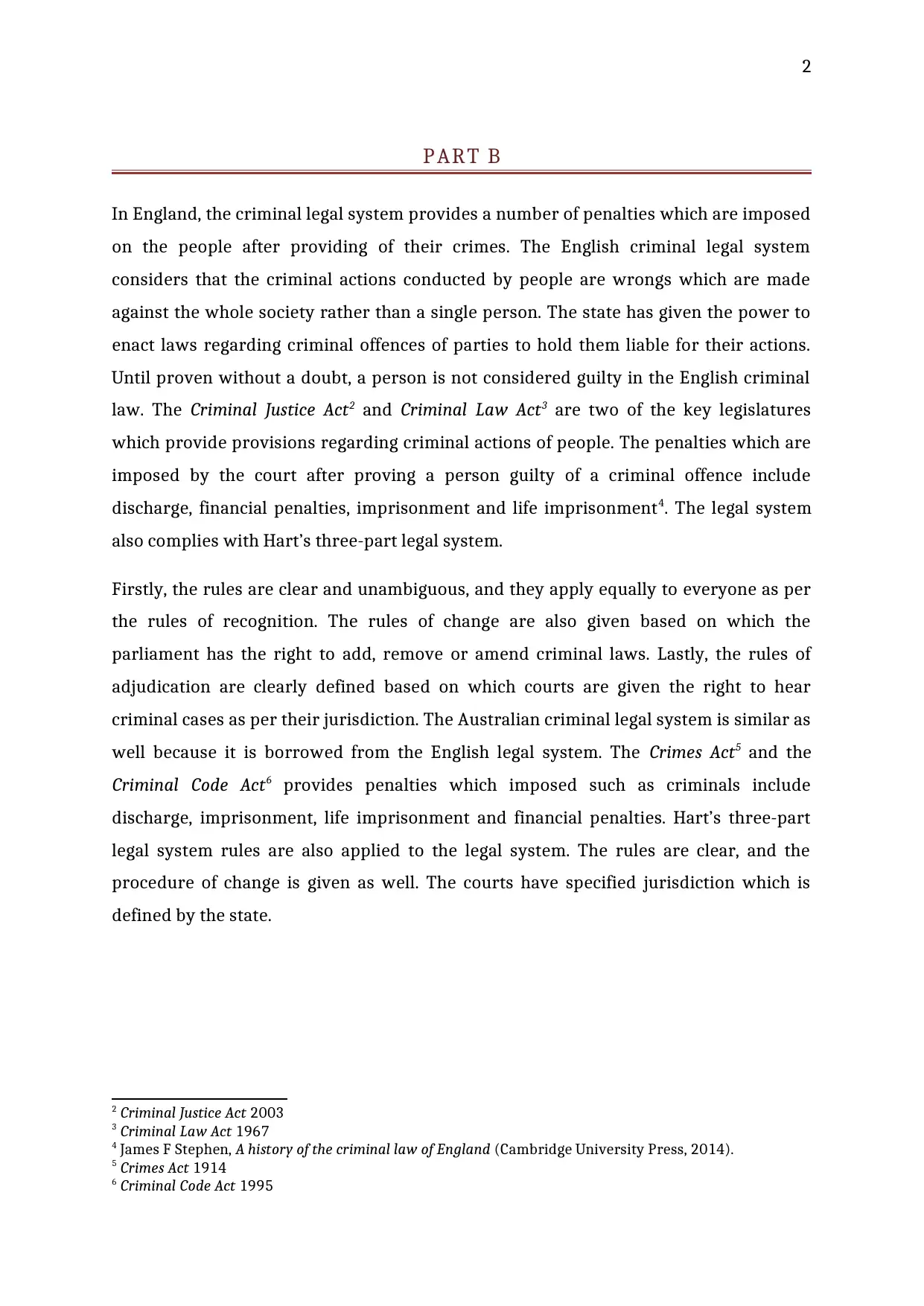
2
PART B
In England, the criminal legal system provides a number of penalties which are imposed
on the people after providing of their crimes. The English criminal legal system
considers that the criminal actions conducted by people are wrongs which are made
against the whole society rather than a single person. The state has given the power to
enact laws regarding criminal offences of parties to hold them liable for their actions.
Until proven without a doubt, a person is not considered guilty in the English criminal
law. The Criminal Justice Act2 and Criminal Law Act3 are two of the key legislatures
which provide provisions regarding criminal actions of people. The penalties which are
imposed by the court after proving a person guilty of a criminal offence include
discharge, financial penalties, imprisonment and life imprisonment4. The legal system
also complies with Hart’s three-part legal system.
Firstly, the rules are clear and unambiguous, and they apply equally to everyone as per
the rules of recognition. The rules of change are also given based on which the
parliament has the right to add, remove or amend criminal laws. Lastly, the rules of
adjudication are clearly defined based on which courts are given the right to hear
criminal cases as per their jurisdiction. The Australian criminal legal system is similar as
well because it is borrowed from the English legal system. The Crimes Act5 and the
Criminal Code Act6 provides penalties which imposed such as criminals include
discharge, imprisonment, life imprisonment and financial penalties. Hart’s three-part
legal system rules are also applied to the legal system. The rules are clear, and the
procedure of change is given as well. The courts have specified jurisdiction which is
defined by the state.
2 Criminal Justice Act 2003
3 Criminal Law Act 1967
4 James F Stephen, A history of the criminal law of England (Cambridge University Press, 2014).
5 Crimes Act 1914
6 Criminal Code Act 1995
PART B
In England, the criminal legal system provides a number of penalties which are imposed
on the people after providing of their crimes. The English criminal legal system
considers that the criminal actions conducted by people are wrongs which are made
against the whole society rather than a single person. The state has given the power to
enact laws regarding criminal offences of parties to hold them liable for their actions.
Until proven without a doubt, a person is not considered guilty in the English criminal
law. The Criminal Justice Act2 and Criminal Law Act3 are two of the key legislatures
which provide provisions regarding criminal actions of people. The penalties which are
imposed by the court after proving a person guilty of a criminal offence include
discharge, financial penalties, imprisonment and life imprisonment4. The legal system
also complies with Hart’s three-part legal system.
Firstly, the rules are clear and unambiguous, and they apply equally to everyone as per
the rules of recognition. The rules of change are also given based on which the
parliament has the right to add, remove or amend criminal laws. Lastly, the rules of
adjudication are clearly defined based on which courts are given the right to hear
criminal cases as per their jurisdiction. The Australian criminal legal system is similar as
well because it is borrowed from the English legal system. The Crimes Act5 and the
Criminal Code Act6 provides penalties which imposed such as criminals include
discharge, imprisonment, life imprisonment and financial penalties. Hart’s three-part
legal system rules are also applied to the legal system. The rules are clear, and the
procedure of change is given as well. The courts have specified jurisdiction which is
defined by the state.
2 Criminal Justice Act 2003
3 Criminal Law Act 1967
4 James F Stephen, A history of the criminal law of England (Cambridge University Press, 2014).
5 Crimes Act 1914
6 Criminal Code Act 1995
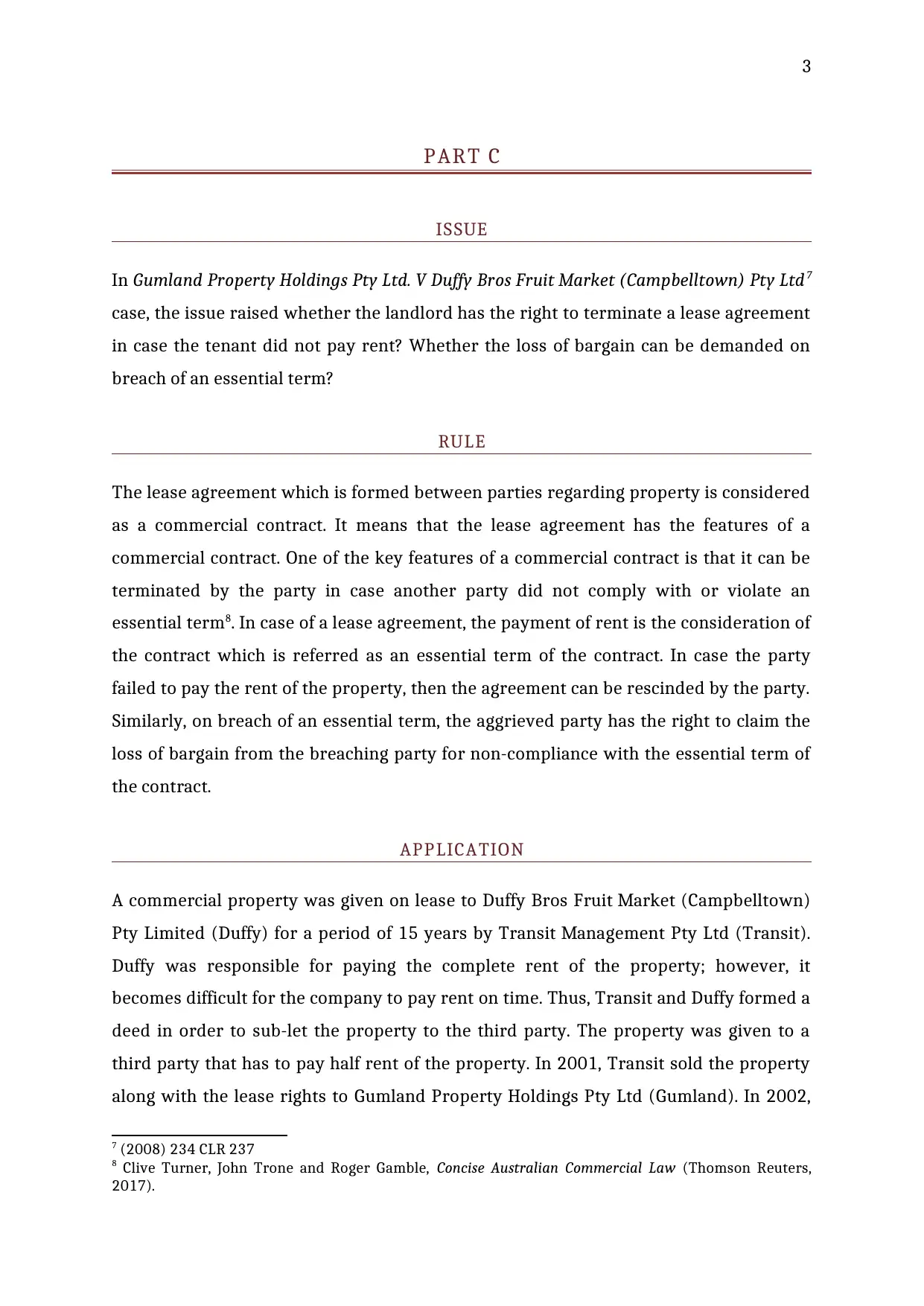
3
PART C
ISSUE
In Gumland Property Holdings Pty Ltd. V Duffy Bros Fruit Market (Campbelltown) Pty Ltd7
case, the issue raised whether the landlord has the right to terminate a lease agreement
in case the tenant did not pay rent? Whether the loss of bargain can be demanded on
breach of an essential term?
RULE
The lease agreement which is formed between parties regarding property is considered
as a commercial contract. It means that the lease agreement has the features of a
commercial contract. One of the key features of a commercial contract is that it can be
terminated by the party in case another party did not comply with or violate an
essential term8. In case of a lease agreement, the payment of rent is the consideration of
the contract which is referred as an essential term of the contract. In case the party
failed to pay the rent of the property, then the agreement can be rescinded by the party.
Similarly, on breach of an essential term, the aggrieved party has the right to claim the
loss of bargain from the breaching party for non-compliance with the essential term of
the contract.
APPLICATION
A commercial property was given on lease to Duffy Bros Fruit Market (Campbelltown)
Pty Limited (Duffy) for a period of 15 years by Transit Management Pty Ltd (Transit).
Duffy was responsible for paying the complete rent of the property; however, it
becomes difficult for the company to pay rent on time. Thus, Transit and Duffy formed a
deed in order to sub-let the property to the third party. The property was given to a
third party that has to pay half rent of the property. In 2001, Transit sold the property
along with the lease rights to Gumland Property Holdings Pty Ltd (Gumland). In 2002,
7 (2008) 234 CLR 237
8 Clive Turner, John Trone and Roger Gamble, Concise Australian Commercial Law (Thomson Reuters,
2017).
PART C
ISSUE
In Gumland Property Holdings Pty Ltd. V Duffy Bros Fruit Market (Campbelltown) Pty Ltd7
case, the issue raised whether the landlord has the right to terminate a lease agreement
in case the tenant did not pay rent? Whether the loss of bargain can be demanded on
breach of an essential term?
RULE
The lease agreement which is formed between parties regarding property is considered
as a commercial contract. It means that the lease agreement has the features of a
commercial contract. One of the key features of a commercial contract is that it can be
terminated by the party in case another party did not comply with or violate an
essential term8. In case of a lease agreement, the payment of rent is the consideration of
the contract which is referred as an essential term of the contract. In case the party
failed to pay the rent of the property, then the agreement can be rescinded by the party.
Similarly, on breach of an essential term, the aggrieved party has the right to claim the
loss of bargain from the breaching party for non-compliance with the essential term of
the contract.
APPLICATION
A commercial property was given on lease to Duffy Bros Fruit Market (Campbelltown)
Pty Limited (Duffy) for a period of 15 years by Transit Management Pty Ltd (Transit).
Duffy was responsible for paying the complete rent of the property; however, it
becomes difficult for the company to pay rent on time. Thus, Transit and Duffy formed a
deed in order to sub-let the property to the third party. The property was given to a
third party that has to pay half rent of the property. In 2001, Transit sold the property
along with the lease rights to Gumland Property Holdings Pty Ltd (Gumland). In 2002,
7 (2008) 234 CLR 237
8 Clive Turner, John Trone and Roger Gamble, Concise Australian Commercial Law (Thomson Reuters,
2017).
Secure Best Marks with AI Grader
Need help grading? Try our AI Grader for instant feedback on your assignments.
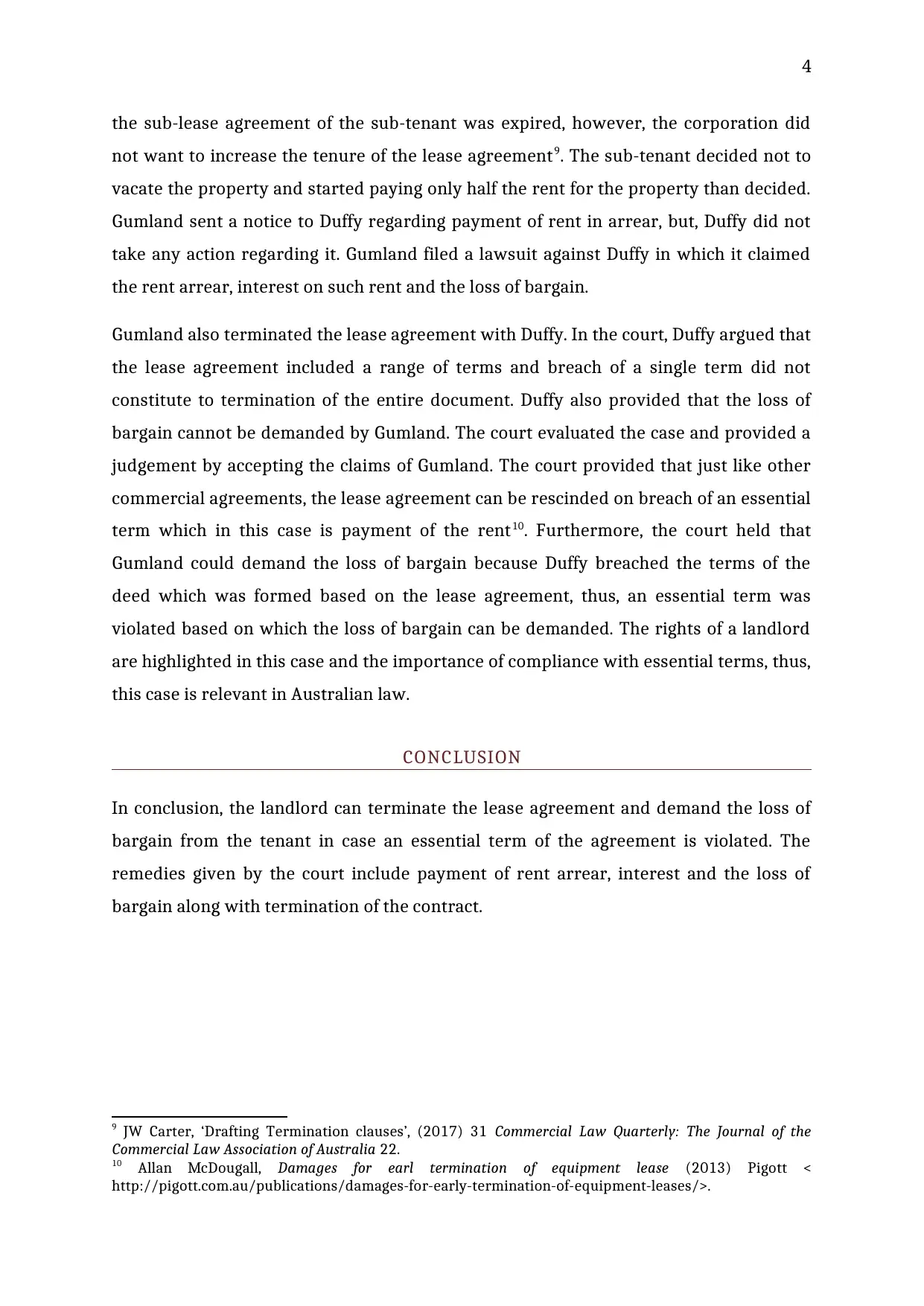
4
the sub-lease agreement of the sub-tenant was expired, however, the corporation did
not want to increase the tenure of the lease agreement9. The sub-tenant decided not to
vacate the property and started paying only half the rent for the property than decided.
Gumland sent a notice to Duffy regarding payment of rent in arrear, but, Duffy did not
take any action regarding it. Gumland filed a lawsuit against Duffy in which it claimed
the rent arrear, interest on such rent and the loss of bargain.
Gumland also terminated the lease agreement with Duffy. In the court, Duffy argued that
the lease agreement included a range of terms and breach of a single term did not
constitute to termination of the entire document. Duffy also provided that the loss of
bargain cannot be demanded by Gumland. The court evaluated the case and provided a
judgement by accepting the claims of Gumland. The court provided that just like other
commercial agreements, the lease agreement can be rescinded on breach of an essential
term which in this case is payment of the rent10. Furthermore, the court held that
Gumland could demand the loss of bargain because Duffy breached the terms of the
deed which was formed based on the lease agreement, thus, an essential term was
violated based on which the loss of bargain can be demanded. The rights of a landlord
are highlighted in this case and the importance of compliance with essential terms, thus,
this case is relevant in Australian law.
CONCLUSION
In conclusion, the landlord can terminate the lease agreement and demand the loss of
bargain from the tenant in case an essential term of the agreement is violated. The
remedies given by the court include payment of rent arrear, interest and the loss of
bargain along with termination of the contract.
9 JW Carter, ‘Drafting Termination clauses’, (2017) 31 Commercial Law Quarterly: The Journal of the
Commercial Law Association of Australia 22.
10 Allan McDougall, Damages for earl termination of equipment lease (2013) Pigott <
http://pigott.com.au/publications/damages-for-early-termination-of-equipment-leases/>.
the sub-lease agreement of the sub-tenant was expired, however, the corporation did
not want to increase the tenure of the lease agreement9. The sub-tenant decided not to
vacate the property and started paying only half the rent for the property than decided.
Gumland sent a notice to Duffy regarding payment of rent in arrear, but, Duffy did not
take any action regarding it. Gumland filed a lawsuit against Duffy in which it claimed
the rent arrear, interest on such rent and the loss of bargain.
Gumland also terminated the lease agreement with Duffy. In the court, Duffy argued that
the lease agreement included a range of terms and breach of a single term did not
constitute to termination of the entire document. Duffy also provided that the loss of
bargain cannot be demanded by Gumland. The court evaluated the case and provided a
judgement by accepting the claims of Gumland. The court provided that just like other
commercial agreements, the lease agreement can be rescinded on breach of an essential
term which in this case is payment of the rent10. Furthermore, the court held that
Gumland could demand the loss of bargain because Duffy breached the terms of the
deed which was formed based on the lease agreement, thus, an essential term was
violated based on which the loss of bargain can be demanded. The rights of a landlord
are highlighted in this case and the importance of compliance with essential terms, thus,
this case is relevant in Australian law.
CONCLUSION
In conclusion, the landlord can terminate the lease agreement and demand the loss of
bargain from the tenant in case an essential term of the agreement is violated. The
remedies given by the court include payment of rent arrear, interest and the loss of
bargain along with termination of the contract.
9 JW Carter, ‘Drafting Termination clauses’, (2017) 31 Commercial Law Quarterly: The Journal of the
Commercial Law Association of Australia 22.
10 Allan McDougall, Damages for earl termination of equipment lease (2013) Pigott <
http://pigott.com.au/publications/damages-for-early-termination-of-equipment-leases/>.
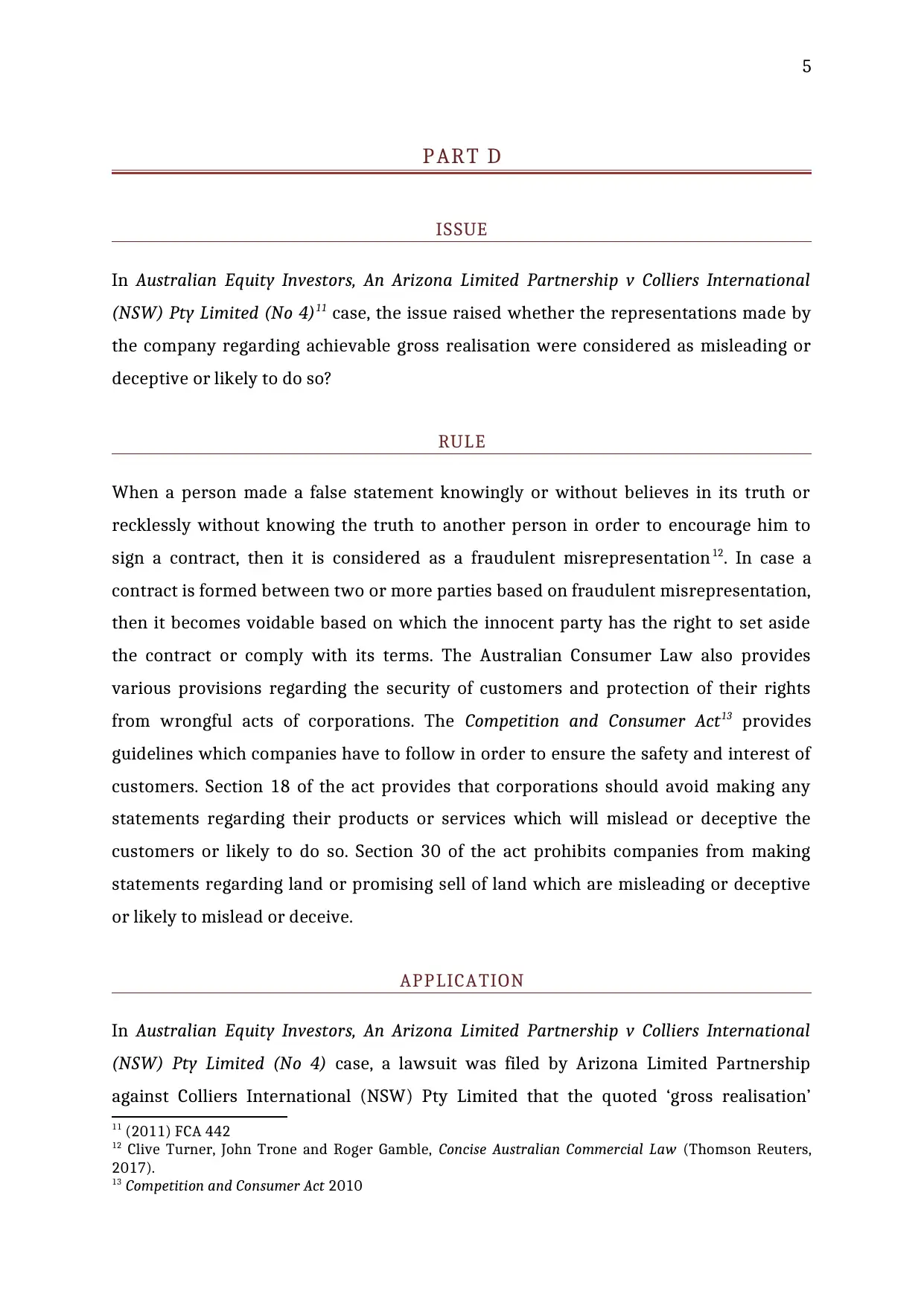
5
PART D
ISSUE
In Australian Equity Investors, An Arizona Limited Partnership v Colliers International
(NSW) Pty Limited (No 4)11 case, the issue raised whether the representations made by
the company regarding achievable gross realisation were considered as misleading or
deceptive or likely to do so?
RULE
When a person made a false statement knowingly or without believes in its truth or
recklessly without knowing the truth to another person in order to encourage him to
sign a contract, then it is considered as a fraudulent misrepresentation12. In case a
contract is formed between two or more parties based on fraudulent misrepresentation,
then it becomes voidable based on which the innocent party has the right to set aside
the contract or comply with its terms. The Australian Consumer Law also provides
various provisions regarding the security of customers and protection of their rights
from wrongful acts of corporations. The Competition and Consumer Act13 provides
guidelines which companies have to follow in order to ensure the safety and interest of
customers. Section 18 of the act provides that corporations should avoid making any
statements regarding their products or services which will mislead or deceptive the
customers or likely to do so. Section 30 of the act prohibits companies from making
statements regarding land or promising sell of land which are misleading or deceptive
or likely to mislead or deceive.
APPLICATION
In Australian Equity Investors, An Arizona Limited Partnership v Colliers International
(NSW) Pty Limited (No 4) case, a lawsuit was filed by Arizona Limited Partnership
against Colliers International (NSW) Pty Limited that the quoted ‘gross realisation’
11 (2011) FCA 442
12 Clive Turner, John Trone and Roger Gamble, Concise Australian Commercial Law (Thomson Reuters,
2017).
13 Competition and Consumer Act 2010
PART D
ISSUE
In Australian Equity Investors, An Arizona Limited Partnership v Colliers International
(NSW) Pty Limited (No 4)11 case, the issue raised whether the representations made by
the company regarding achievable gross realisation were considered as misleading or
deceptive or likely to do so?
RULE
When a person made a false statement knowingly or without believes in its truth or
recklessly without knowing the truth to another person in order to encourage him to
sign a contract, then it is considered as a fraudulent misrepresentation12. In case a
contract is formed between two or more parties based on fraudulent misrepresentation,
then it becomes voidable based on which the innocent party has the right to set aside
the contract or comply with its terms. The Australian Consumer Law also provides
various provisions regarding the security of customers and protection of their rights
from wrongful acts of corporations. The Competition and Consumer Act13 provides
guidelines which companies have to follow in order to ensure the safety and interest of
customers. Section 18 of the act provides that corporations should avoid making any
statements regarding their products or services which will mislead or deceptive the
customers or likely to do so. Section 30 of the act prohibits companies from making
statements regarding land or promising sell of land which are misleading or deceptive
or likely to mislead or deceive.
APPLICATION
In Australian Equity Investors, An Arizona Limited Partnership v Colliers International
(NSW) Pty Limited (No 4) case, a lawsuit was filed by Arizona Limited Partnership
against Colliers International (NSW) Pty Limited that the quoted ‘gross realisation’
11 (2011) FCA 442
12 Clive Turner, John Trone and Roger Gamble, Concise Australian Commercial Law (Thomson Reuters,
2017).
13 Competition and Consumer Act 2010
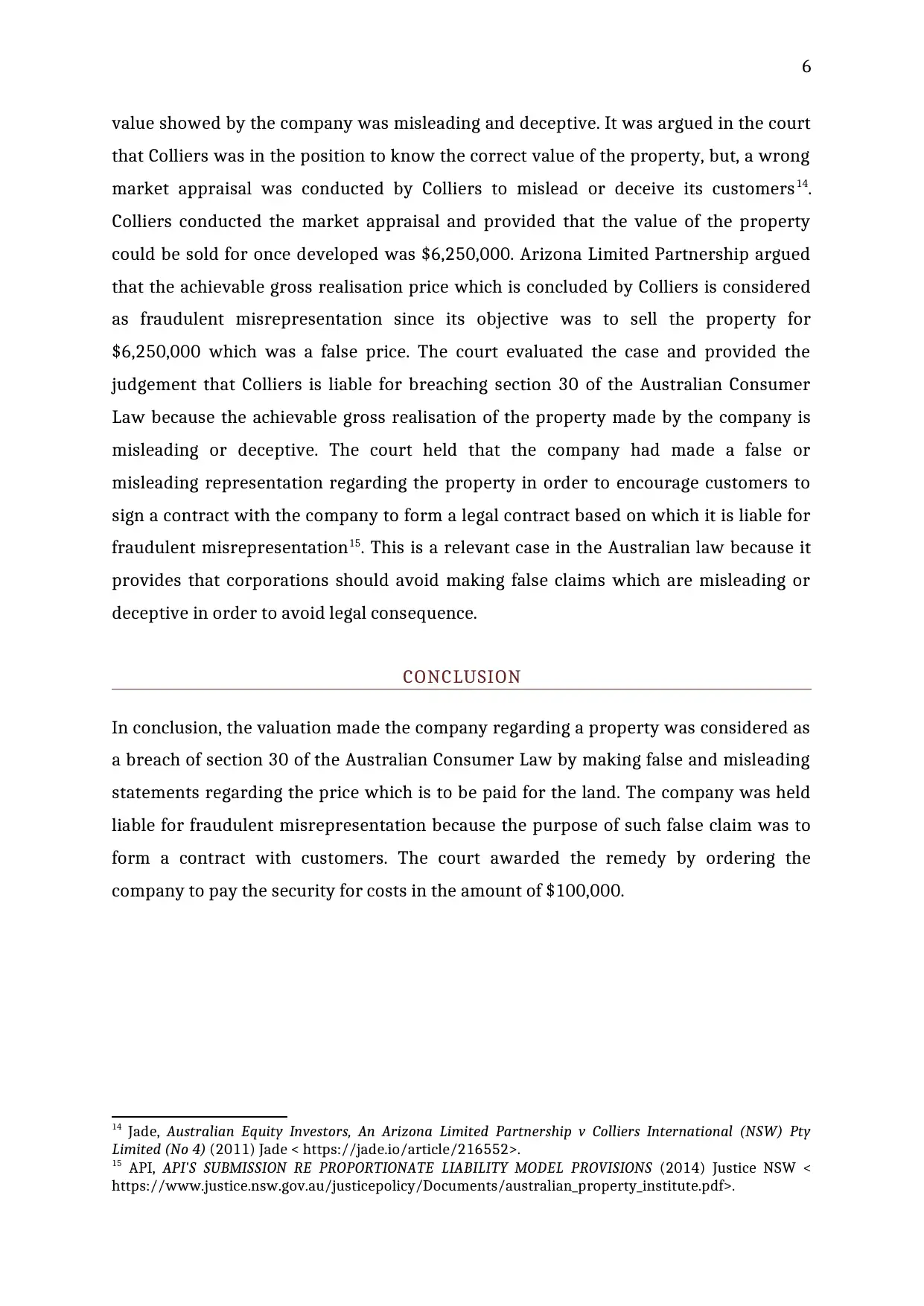
6
value showed by the company was misleading and deceptive. It was argued in the court
that Colliers was in the position to know the correct value of the property, but, a wrong
market appraisal was conducted by Colliers to mislead or deceive its customers14.
Colliers conducted the market appraisal and provided that the value of the property
could be sold for once developed was $6,250,000. Arizona Limited Partnership argued
that the achievable gross realisation price which is concluded by Colliers is considered
as fraudulent misrepresentation since its objective was to sell the property for
$6,250,000 which was a false price. The court evaluated the case and provided the
judgement that Colliers is liable for breaching section 30 of the Australian Consumer
Law because the achievable gross realisation of the property made by the company is
misleading or deceptive. The court held that the company had made a false or
misleading representation regarding the property in order to encourage customers to
sign a contract with the company to form a legal contract based on which it is liable for
fraudulent misrepresentation15. This is a relevant case in the Australian law because it
provides that corporations should avoid making false claims which are misleading or
deceptive in order to avoid legal consequence.
CONCLUSION
In conclusion, the valuation made the company regarding a property was considered as
a breach of section 30 of the Australian Consumer Law by making false and misleading
statements regarding the price which is to be paid for the land. The company was held
liable for fraudulent misrepresentation because the purpose of such false claim was to
form a contract with customers. The court awarded the remedy by ordering the
company to pay the security for costs in the amount of $100,000.
14 Jade, Australian Equity Investors, An Arizona Limited Partnership v Colliers International (NSW) Pty
Limited (No 4) (2011) Jade < https://jade.io/article/216552>.
15 API, API'S SUBMISSION RE PROPORTIONATE LIABILITY MODEL PROVISIONS (2014) Justice NSW <
https://www.justice.nsw.gov.au/justicepolicy/Documents/australian_property_institute.pdf>.
value showed by the company was misleading and deceptive. It was argued in the court
that Colliers was in the position to know the correct value of the property, but, a wrong
market appraisal was conducted by Colliers to mislead or deceive its customers14.
Colliers conducted the market appraisal and provided that the value of the property
could be sold for once developed was $6,250,000. Arizona Limited Partnership argued
that the achievable gross realisation price which is concluded by Colliers is considered
as fraudulent misrepresentation since its objective was to sell the property for
$6,250,000 which was a false price. The court evaluated the case and provided the
judgement that Colliers is liable for breaching section 30 of the Australian Consumer
Law because the achievable gross realisation of the property made by the company is
misleading or deceptive. The court held that the company had made a false or
misleading representation regarding the property in order to encourage customers to
sign a contract with the company to form a legal contract based on which it is liable for
fraudulent misrepresentation15. This is a relevant case in the Australian law because it
provides that corporations should avoid making false claims which are misleading or
deceptive in order to avoid legal consequence.
CONCLUSION
In conclusion, the valuation made the company regarding a property was considered as
a breach of section 30 of the Australian Consumer Law by making false and misleading
statements regarding the price which is to be paid for the land. The company was held
liable for fraudulent misrepresentation because the purpose of such false claim was to
form a contract with customers. The court awarded the remedy by ordering the
company to pay the security for costs in the amount of $100,000.
14 Jade, Australian Equity Investors, An Arizona Limited Partnership v Colliers International (NSW) Pty
Limited (No 4) (2011) Jade < https://jade.io/article/216552>.
15 API, API'S SUBMISSION RE PROPORTIONATE LIABILITY MODEL PROVISIONS (2014) Justice NSW <
https://www.justice.nsw.gov.au/justicepolicy/Documents/australian_property_institute.pdf>.
Paraphrase This Document
Need a fresh take? Get an instant paraphrase of this document with our AI Paraphraser
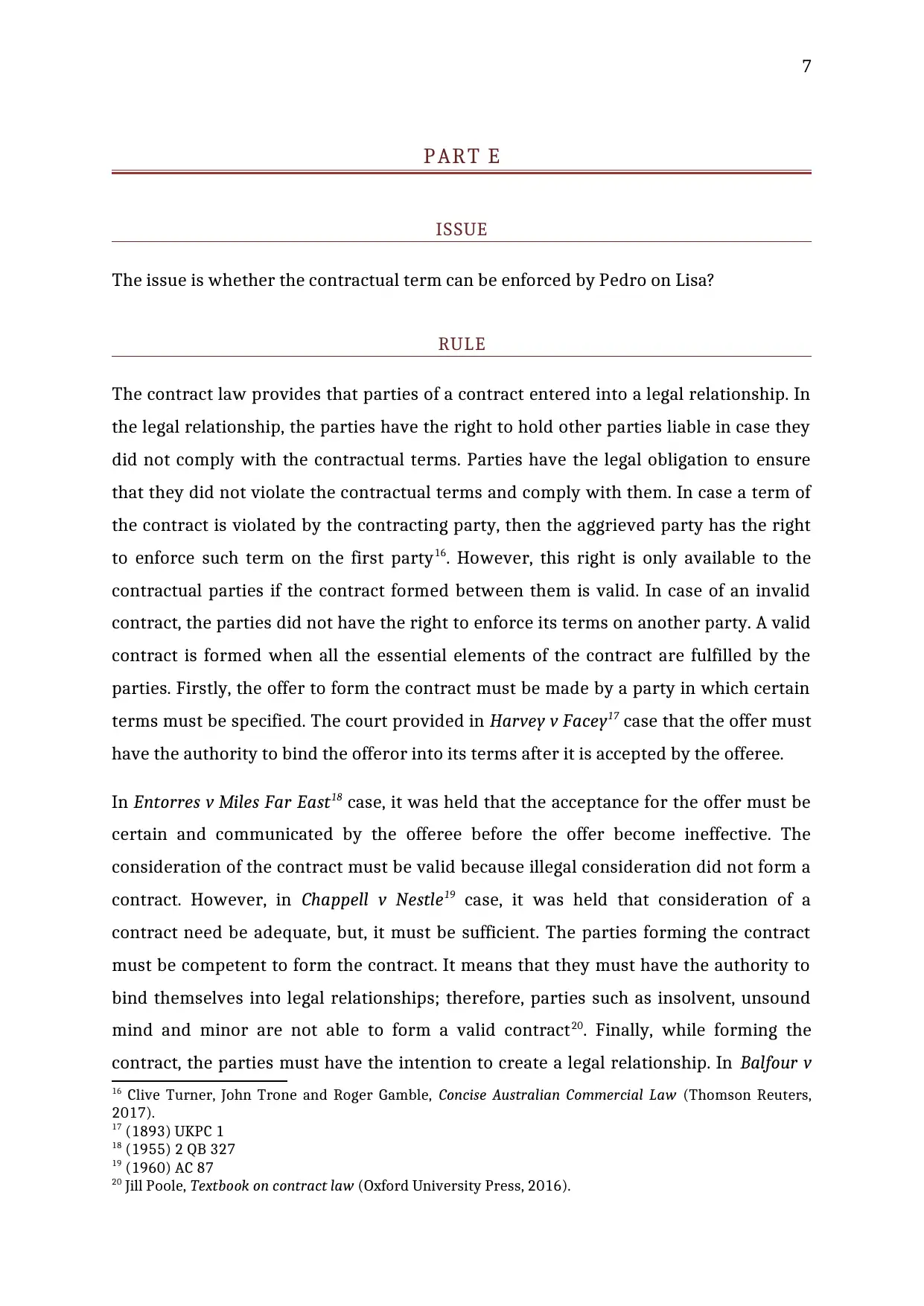
7
PART E
ISSUE
The issue is whether the contractual term can be enforced by Pedro on Lisa?
RULE
The contract law provides that parties of a contract entered into a legal relationship. In
the legal relationship, the parties have the right to hold other parties liable in case they
did not comply with the contractual terms. Parties have the legal obligation to ensure
that they did not violate the contractual terms and comply with them. In case a term of
the contract is violated by the contracting party, then the aggrieved party has the right
to enforce such term on the first party16. However, this right is only available to the
contractual parties if the contract formed between them is valid. In case of an invalid
contract, the parties did not have the right to enforce its terms on another party. A valid
contract is formed when all the essential elements of the contract are fulfilled by the
parties. Firstly, the offer to form the contract must be made by a party in which certain
terms must be specified. The court provided in Harvey v Facey17 case that the offer must
have the authority to bind the offeror into its terms after it is accepted by the offeree.
In Entorres v Miles Far East18 case, it was held that the acceptance for the offer must be
certain and communicated by the offeree before the offer become ineffective. The
consideration of the contract must be valid because illegal consideration did not form a
contract. However, in Chappell v Nestle19 case, it was held that consideration of a
contract need be adequate, but, it must be sufficient. The parties forming the contract
must be competent to form the contract. It means that they must have the authority to
bind themselves into legal relationships; therefore, parties such as insolvent, unsound
mind and minor are not able to form a valid contract20. Finally, while forming the
contract, the parties must have the intention to create a legal relationship. In Balfour v
16 Clive Turner, John Trone and Roger Gamble, Concise Australian Commercial Law (Thomson Reuters,
2017).
17 (1893) UKPC 1
18 (1955) 2 QB 327
19 (1960) AC 87
20 Jill Poole, Textbook on contract law (Oxford University Press, 2016).
PART E
ISSUE
The issue is whether the contractual term can be enforced by Pedro on Lisa?
RULE
The contract law provides that parties of a contract entered into a legal relationship. In
the legal relationship, the parties have the right to hold other parties liable in case they
did not comply with the contractual terms. Parties have the legal obligation to ensure
that they did not violate the contractual terms and comply with them. In case a term of
the contract is violated by the contracting party, then the aggrieved party has the right
to enforce such term on the first party16. However, this right is only available to the
contractual parties if the contract formed between them is valid. In case of an invalid
contract, the parties did not have the right to enforce its terms on another party. A valid
contract is formed when all the essential elements of the contract are fulfilled by the
parties. Firstly, the offer to form the contract must be made by a party in which certain
terms must be specified. The court provided in Harvey v Facey17 case that the offer must
have the authority to bind the offeror into its terms after it is accepted by the offeree.
In Entorres v Miles Far East18 case, it was held that the acceptance for the offer must be
certain and communicated by the offeree before the offer become ineffective. The
consideration of the contract must be valid because illegal consideration did not form a
contract. However, in Chappell v Nestle19 case, it was held that consideration of a
contract need be adequate, but, it must be sufficient. The parties forming the contract
must be competent to form the contract. It means that they must have the authority to
bind themselves into legal relationships; therefore, parties such as insolvent, unsound
mind and minor are not able to form a valid contract20. Finally, while forming the
contract, the parties must have the intention to create a legal relationship. In Balfour v
16 Clive Turner, John Trone and Roger Gamble, Concise Australian Commercial Law (Thomson Reuters,
2017).
17 (1893) UKPC 1
18 (1955) 2 QB 327
19 (1960) AC 87
20 Jill Poole, Textbook on contract law (Oxford University Press, 2016).
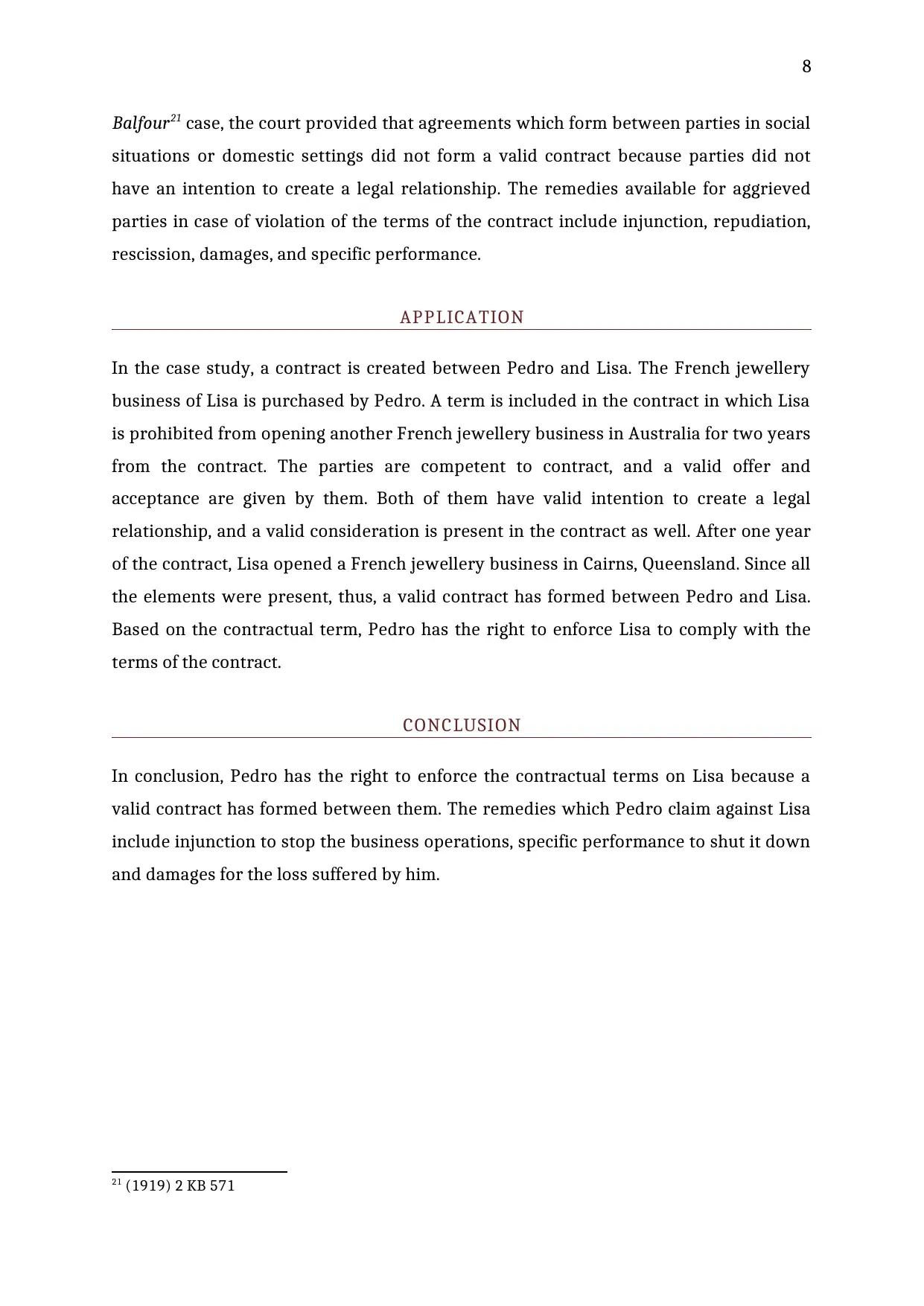
8
Balfour21 case, the court provided that agreements which form between parties in social
situations or domestic settings did not form a valid contract because parties did not
have an intention to create a legal relationship. The remedies available for aggrieved
parties in case of violation of the terms of the contract include injunction, repudiation,
rescission, damages, and specific performance.
APPLICATION
In the case study, a contract is created between Pedro and Lisa. The French jewellery
business of Lisa is purchased by Pedro. A term is included in the contract in which Lisa
is prohibited from opening another French jewellery business in Australia for two years
from the contract. The parties are competent to contract, and a valid offer and
acceptance are given by them. Both of them have valid intention to create a legal
relationship, and a valid consideration is present in the contract as well. After one year
of the contract, Lisa opened a French jewellery business in Cairns, Queensland. Since all
the elements were present, thus, a valid contract has formed between Pedro and Lisa.
Based on the contractual term, Pedro has the right to enforce Lisa to comply with the
terms of the contract.
CONCLUSION
In conclusion, Pedro has the right to enforce the contractual terms on Lisa because a
valid contract has formed between them. The remedies which Pedro claim against Lisa
include injunction to stop the business operations, specific performance to shut it down
and damages for the loss suffered by him.
21 (1919) 2 KB 571
Balfour21 case, the court provided that agreements which form between parties in social
situations or domestic settings did not form a valid contract because parties did not
have an intention to create a legal relationship. The remedies available for aggrieved
parties in case of violation of the terms of the contract include injunction, repudiation,
rescission, damages, and specific performance.
APPLICATION
In the case study, a contract is created between Pedro and Lisa. The French jewellery
business of Lisa is purchased by Pedro. A term is included in the contract in which Lisa
is prohibited from opening another French jewellery business in Australia for two years
from the contract. The parties are competent to contract, and a valid offer and
acceptance are given by them. Both of them have valid intention to create a legal
relationship, and a valid consideration is present in the contract as well. After one year
of the contract, Lisa opened a French jewellery business in Cairns, Queensland. Since all
the elements were present, thus, a valid contract has formed between Pedro and Lisa.
Based on the contractual term, Pedro has the right to enforce Lisa to comply with the
terms of the contract.
CONCLUSION
In conclusion, Pedro has the right to enforce the contractual terms on Lisa because a
valid contract has formed between them. The remedies which Pedro claim against Lisa
include injunction to stop the business operations, specific performance to shut it down
and damages for the loss suffered by him.
21 (1919) 2 KB 571
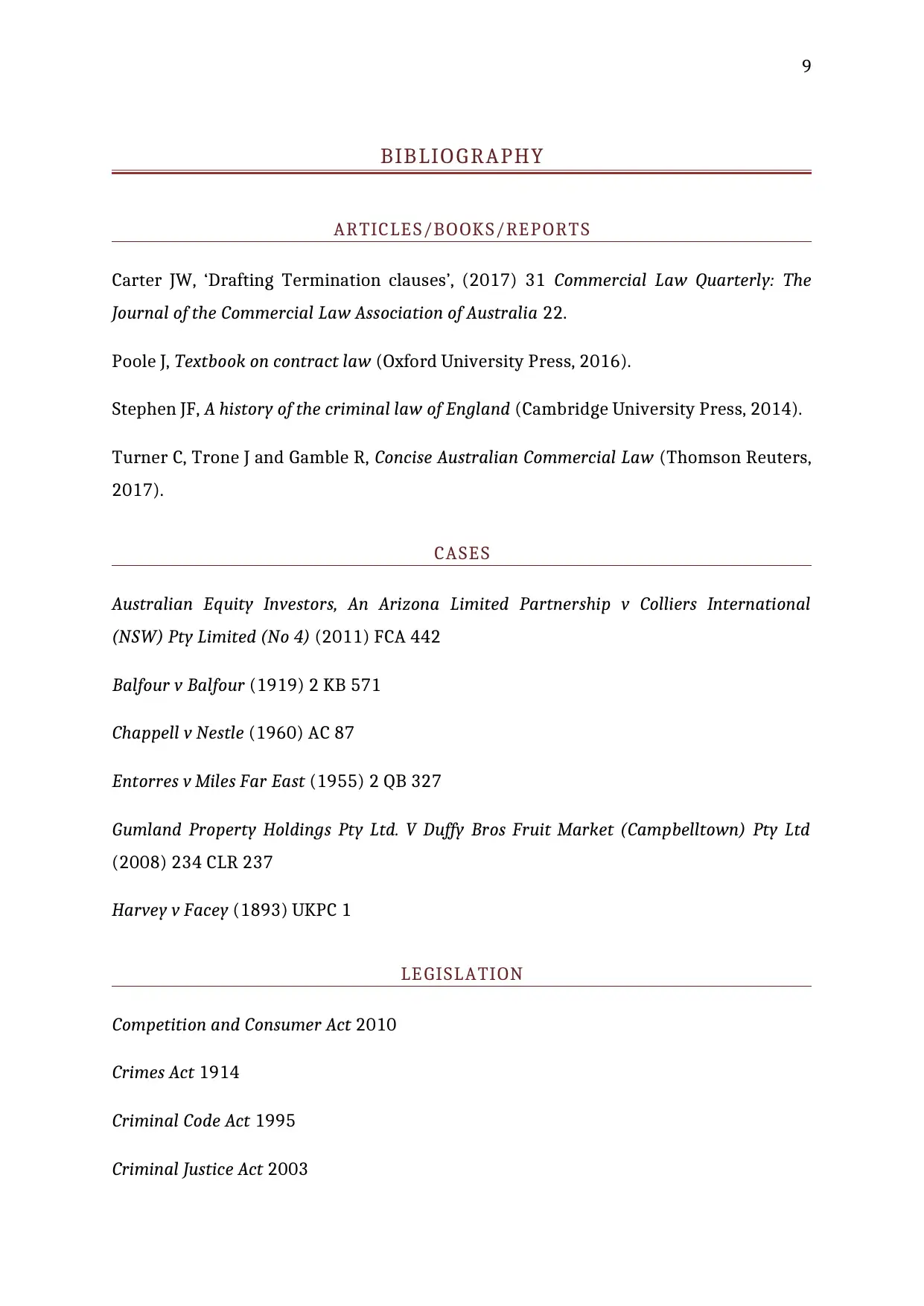
9
BIBLIOGRAPHY
ARTICLES/BOOKS/REPORTS
Carter JW, ‘Drafting Termination clauses’, (2017) 31 Commercial Law Quarterly: The
Journal of the Commercial Law Association of Australia 22.
Poole J, Textbook on contract law (Oxford University Press, 2016).
Stephen JF, A history of the criminal law of England (Cambridge University Press, 2014).
Turner C, Trone J and Gamble R, Concise Australian Commercial Law (Thomson Reuters,
2017).
CASES
Australian Equity Investors, An Arizona Limited Partnership v Colliers International
(NSW) Pty Limited (No 4) (2011) FCA 442
Balfour v Balfour (1919) 2 KB 571
Chappell v Nestle (1960) AC 87
Entorres v Miles Far East (1955) 2 QB 327
Gumland Property Holdings Pty Ltd. V Duffy Bros Fruit Market (Campbelltown) Pty Ltd
(2008) 234 CLR 237
Harvey v Facey (1893) UKPC 1
LEGISLATION
Competition and Consumer Act 2010
Crimes Act 1914
Criminal Code Act 1995
Criminal Justice Act 2003
BIBLIOGRAPHY
ARTICLES/BOOKS/REPORTS
Carter JW, ‘Drafting Termination clauses’, (2017) 31 Commercial Law Quarterly: The
Journal of the Commercial Law Association of Australia 22.
Poole J, Textbook on contract law (Oxford University Press, 2016).
Stephen JF, A history of the criminal law of England (Cambridge University Press, 2014).
Turner C, Trone J and Gamble R, Concise Australian Commercial Law (Thomson Reuters,
2017).
CASES
Australian Equity Investors, An Arizona Limited Partnership v Colliers International
(NSW) Pty Limited (No 4) (2011) FCA 442
Balfour v Balfour (1919) 2 KB 571
Chappell v Nestle (1960) AC 87
Entorres v Miles Far East (1955) 2 QB 327
Gumland Property Holdings Pty Ltd. V Duffy Bros Fruit Market (Campbelltown) Pty Ltd
(2008) 234 CLR 237
Harvey v Facey (1893) UKPC 1
LEGISLATION
Competition and Consumer Act 2010
Crimes Act 1914
Criminal Code Act 1995
Criminal Justice Act 2003
Secure Best Marks with AI Grader
Need help grading? Try our AI Grader for instant feedback on your assignments.
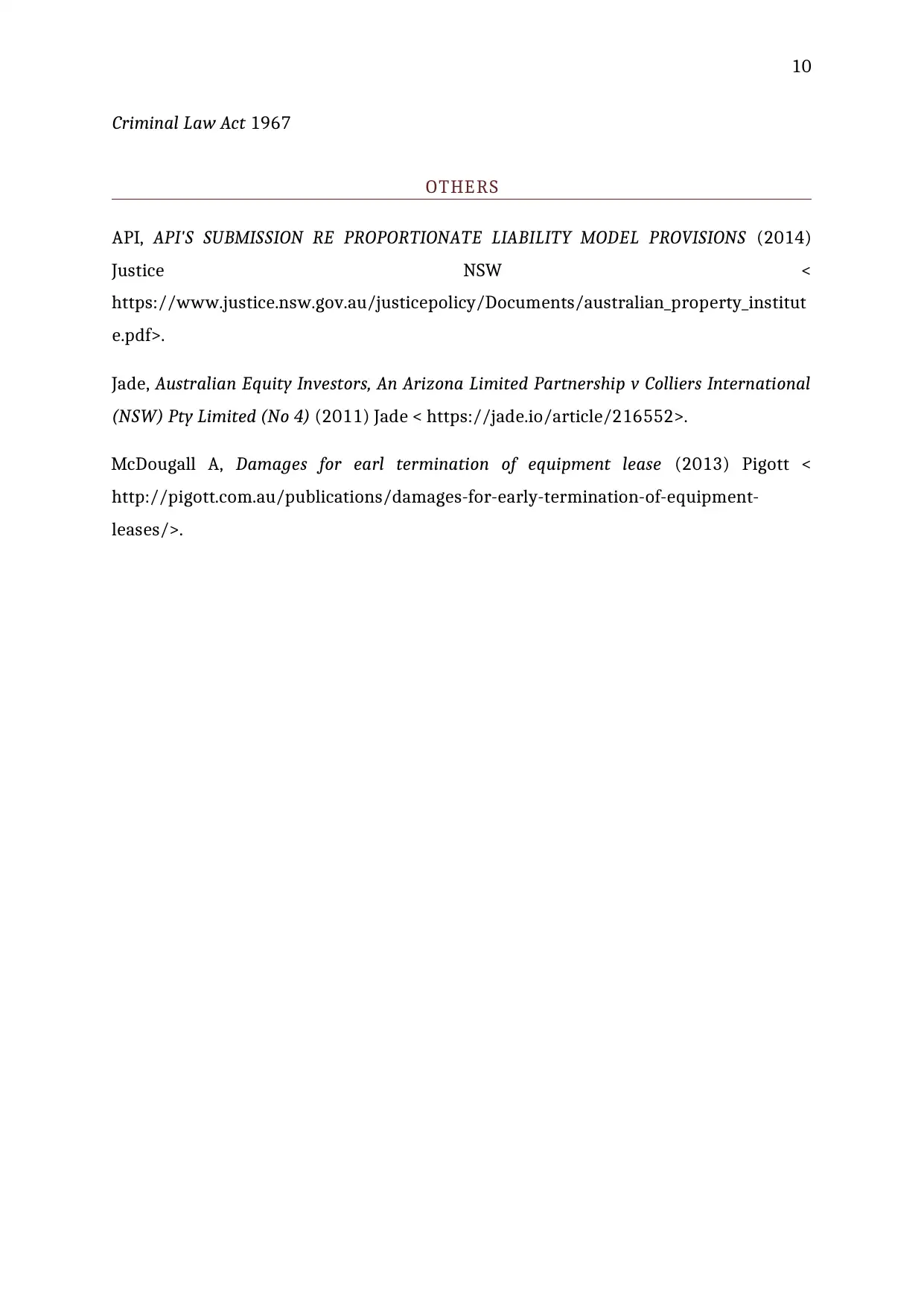
10
Criminal Law Act 1967
OTHERS
API, API'S SUBMISSION RE PROPORTIONATE LIABILITY MODEL PROVISIONS (2014)
Justice NSW <
https://www.justice.nsw.gov.au/justicepolicy/Documents/australian_property_institut
e.pdf>.
Jade, Australian Equity Investors, An Arizona Limited Partnership v Colliers International
(NSW) Pty Limited (No 4) (2011) Jade < https://jade.io/article/216552>.
McDougall A, Damages for earl termination of equipment lease (2013) Pigott <
http://pigott.com.au/publications/damages-for-early-termination-of-equipment-
leases/>.
Criminal Law Act 1967
OTHERS
API, API'S SUBMISSION RE PROPORTIONATE LIABILITY MODEL PROVISIONS (2014)
Justice NSW <
https://www.justice.nsw.gov.au/justicepolicy/Documents/australian_property_institut
e.pdf>.
Jade, Australian Equity Investors, An Arizona Limited Partnership v Colliers International
(NSW) Pty Limited (No 4) (2011) Jade < https://jade.io/article/216552>.
McDougall A, Damages for earl termination of equipment lease (2013) Pigott <
http://pigott.com.au/publications/damages-for-early-termination-of-equipment-
leases/>.
1 out of 11
Related Documents
Your All-in-One AI-Powered Toolkit for Academic Success.
+13062052269
info@desklib.com
Available 24*7 on WhatsApp / Email
![[object Object]](/_next/static/media/star-bottom.7253800d.svg)
Unlock your academic potential
© 2024 | Zucol Services PVT LTD | All rights reserved.



